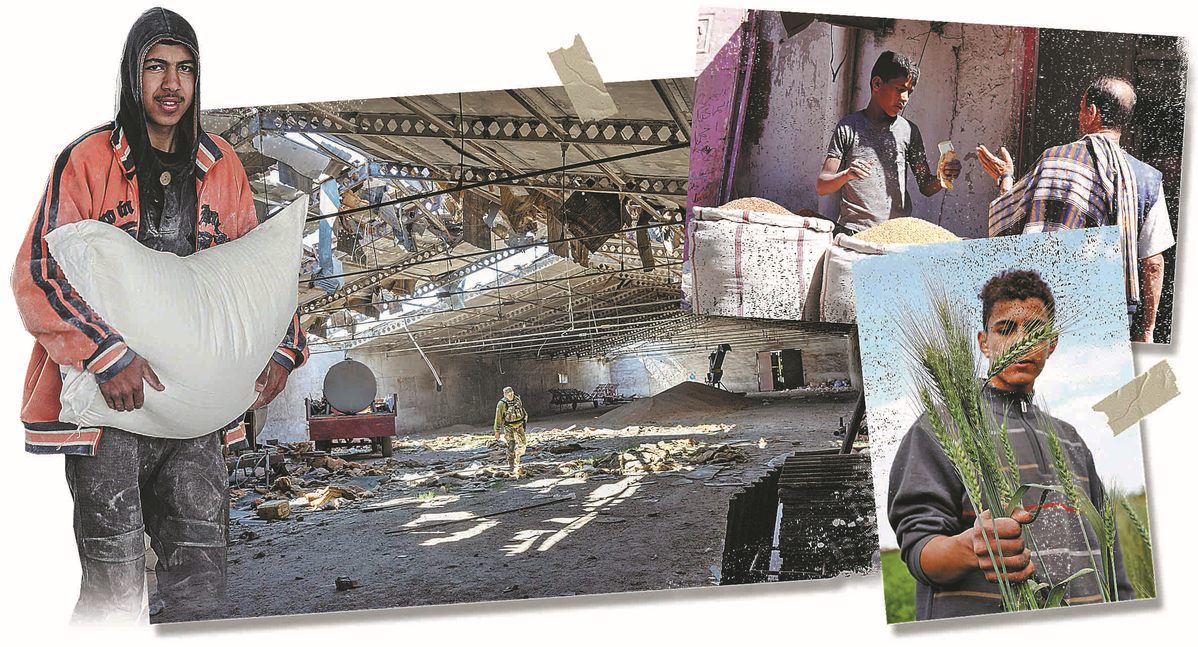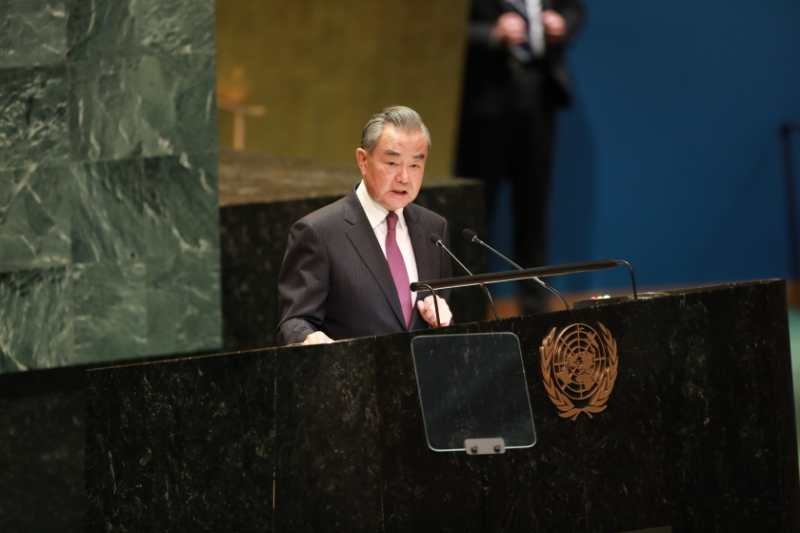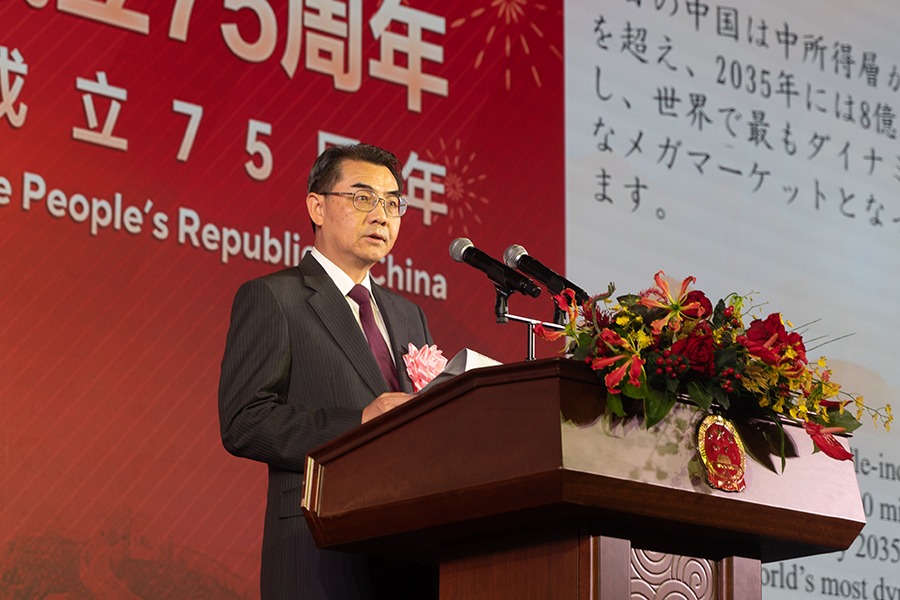Food insecurity fears mount amid conflict


Prices soar worldwide due to affected supplies
With the number of people without enough food each day reaching a record high last year, the Russia-Ukraine conflict is adding to this problem.
The crisis has severely affected food production, sending prices soaring worldwide. It has also triggered protectionism of food products in certain countries, and the lack of food could cause instability in some nations and regions.
On May 4, the annual report by the Global Network Against Food Crises said that about 193 million people in 53 countries or territories experienced acute food insecurity at crisis levels or even worse last year. This represents a rise of nearly 40 million people compared with the record numbers recorded in 2020.
Conflict was the main driver of food insecurity even before the Russia-Ukraine crisis started on Feb 24.
David Beasley, executive director of the UN World Food Program, said, "Acute hunger is soaring to unprecedented levels and the global situation just keeps getting worse."
He added that conflict, the climate crisis, the COVID-19 pandemic and surging food and fuel costs have created "a perfect storm", while the Russia-Ukraine conflict is "piling catastrophe on top of catastrophe".
"Millions of people in dozens of countries are being driven to the edge of starvation. We urgently need emergency funding to pull them back from the brink and turn this global crisis around before it is too late," he said.
Russia and Ukraine are among the world's most important producers of agricultural commodities. Both countries are net exporters of agricultural produce and play leading supply roles in global foodstuff and fertilizer markets.
Last year, Russia and Ukraine ranked among the top three global exporters of wheat, maize, rapeseed, sunflower seeds and sunflower oil, according to the UN's Food and Agriculture Organization, or FAO. Russia was also the world's top exporter of nitrogen fertilizers and the second leading supplier of potassium and phosphorous fertilizers.
Chen Yangfen, a researcher at the Chinese Academy of Agricultural Sciences' Institute of Agricultural Economics and Development, said the production, processing and transportation of sunflower seeds, wheat and barley in Ukraine's main producing areas have basically stagnated due to the conflict with Russia. As March to May is the wheat and corn planting season, and with the conflict continuing, Ukraine could miss out on this season, seriously affecting annual grain production.
Figures from Ukraine's Ministry of Agrarian Policy and Food on April 28 showed that spring crops had been sown on 2.5 million hectares of land in the country, accounting for only 20 percent of the projected planting area.
Uncertainty also surrounds the prospects for Russian exports. The West, led by the United States, continues to step up sanctions against Russia, which have also had a great impact on Russia's agricultural production, particularly pesticides, seeds and produce for export.
Chen said: "Russia's agricultural production is highly dependent on imported seeds, but some seedling companies have said they will stop non-essential business in Russia. Some international grain merchants also said they will reduce investment in Russian agriculture, all of which will directly hurt the country's agricultural sector and global food supplies."
FAO projections suggest that in view of this situation, the number of undernourished people worldwide could grow by 8 million to 13 million people in 2022-23, with the most pronounced increases occurring in the Asia-Pacific region, followed by sub-Saharan Africa, the Near East and North Africa.
According to the World Bank's Commodity Markets Outlook report published last month, the Russia-Ukraine conflict will result in oil prices rising by more than 40 percent this year, and non-energy prices growing by nearly 20 percent. Wheat prices are projected to rise by over 40 percent.
Fears increase
Ervin Prifti, a senior economist at the International Monetary Fund's research department, said the pandemic set the world back by a decade, pushing the prevalence of undernourishment to 9.9 percent through a combination of lost income and food price rises. The Ukraine crisis added to pandemic-related factors, which had been pushing up food commodity prices for almost 18 months.
The fallout from the conflict has yet to become fully apparent, but the situation could worsen, depending on how several risk factors play out in coming months, including the progress of planting in Ukraine, Prifti said.
The likelihood of a "perfect storm" resulting in even higher food prices has increased due to exceptionally tightened global fertilizer supplies that may push down yields in the current or next agricultural year, he added.
Prifti said a shortage of food "outside of fragile and humanitarian contexts" is highly unlikely, but many countries are also experiencing increased food prices due to high energy costs and supply chain disruptions.
"To the extent that some wages and incomes, especially in poor households, are not able to keep up with the price increases, purchasing power could be eroded, resulting in a higher likelihood of more people having to switch to qualitatively inferior diets or even falling below the undernourishment threshold," he said.
Prifti added that increased food prices will be experienced globally, but some countries are more vulnerable than others--for example, low-income nations heavily dependent on wheat imports.
"Disruptions may be even greater for countries with strong trade links to Russia and Ukraine, as rerouting imports from other nations may take time. Specifically, countries in the Middle East and North Africa such as Egypt, Lebanon and Tunisia seem to fit this profile," Prifti said.
More generally, low-income countries heavily dependent on food imports should expect higher bills for produce, along with rising food price inflation. In turn, these factors may put pressure on the budgets of governments that provide subsidies to make food more affordable for their people, he added.
Chen said Middle Eastern, North African and South Asian countries, especially developing nations such as Lebanon and Yemen, will bear the brunt of the Ukraine crisis, as they already face a food insecurity emergency and are highly dependent on Russia and Ukraine for food imports.
"Given the large export scales of Russia and Ukraine, trade restrictions in the short term, and rising prices for global agricultural produce, it is not easy for these regions to obtain alternative food sources, and their import costs will rise significantly, aggravating the already serious food insecurity situation," he said.
David Laborde, a senior research fellow at the International Food Policy Research Institute, or IFPRI, said South Asian countries such as Bangladesh could also be affected by the military conflict in Europe, which has disrupted global trade of key supplies such as wheat, vegetable oil and fertilizers.
According to an IFPRI report issued late last month, Bangladesh, which depends on imports of such supplies to feed its large population, "faces the prospect of rising food insecurity."
Clayton Hazvinei Vhumbunu, a research fellow in international relations at the University of Pretoria in South Africa, said the Russian-Ukraine conflict has triggered a global economic shock. Three main factors resulting from the crisis will ultimately impact food security in Africa-rising oil, fertilizer and food import prices.
He said the conflict triggered rising oil prices in Africa and elsewhere in the world. Rising fuel prices, considered to be the most severe since the 1973 oil crisis, have been experienced in most African nations since March, triggering inflation that will limit some households' access to food.
The Russia-Ukraine conflict has affected the supply and cost of fertilizers, and the impact has started to be felt by African countries that import sizable amounts of fertilizers from these two nations.
Moreover, many African countries, including Egypt, Ethiopia, Kenya, Libya, Morocco, Nigeria, Senegal, South Africa, Sudan and Tunisia, are heavily dependent on food imports from Russia, especially cereals, sunflower oil and maize. The Russian-Ukraine conflict may worsen the situation and result in further food insecurities, Vhumbunu said.
He added that the conflict is a serious concern, as Africa already faces food security threats, and the continent accounts for nearly 80 percent of all Low-Income Food-Deficit Countries worldwide.
"Therefore, global conflicts that alter trade, production and consumption patterns are a grave concern to Africa, especially considering the fact that we are still building back on the destruction caused by the pandemic," he added.
Exports curbed
Li Yonghui, a researcher of Russian studies at the Chinese Academy of Social Sciences, said the world is not running out of food yet. However, fears of scarcity, rather than actual conditions in food markets, and the prospect of future shortages, have prompted some major food producers to restrict exports of agricultural produce.
"Some countries have enough food stocks, but that doesn't mean their surplus supplies will go to nations that already face food shortages, because they (food-sufficient countries) fear that if the Russian-Ukraine conflict continues for a long time, they will first have to ensure that domestic needs are met," she said.
An IFPRI blog said that since the Russian-Ukraine conflict began, as of early last month, the number of countries imposing food export restrictions had risen from three to 16.
Russia temporarily banned exports of white sugar and sugar cane, along with grain exports to the Eurasian Economic Union. Ukraine has banned exports of wheat, oats and other staples crucial for global food supplies to ensure adequate stocks for its population during the conflict. Other notable suppliers imposing restrictions include Indonesia, which has banned palm oil exports, Argentina, where a ban on beef exports has been imposed, and Turkey, Kyrgyzstan and Kazakhstan, which have prohibited exports of a range of grain produce. Meanwhile, India banned wheat exports that did not have government approval.
Prifti, from the International Monetary Fund, said food protectionism caused by banned grain exports will result in similar action being taken by other countries, leading to further tightened global food supplies, which will worsen shortages and trigger rising prices and volatility.
A series of trade restrictions during the 2007-08 global food price crisis resulted in even higher prices and heightened food insecurity.
"The same is true for panic-driven stockpiling by countries that artificially raise demand and contribute to global imbalances in reserves," Prifti said.
According to the IFPRI blog, research on the impact of export restrictions during the global food price crisis suggests that such policies contributed to 40 percent of the increased agricultural prices at that time.
Prifti added that food price inflation is neither a necessary nor sufficient condition for political instability, but history has shown that it can raise social tensions. Sometimes, combined with other conditions, such inflation can trigger public discontent.
Li said that as food price inflation increases globally, and with no quick resolution to the Russia-Ukraine crisis in sight, more countries may impose export restrictions. Protectionism in the agricultural sector would further worsen food insecurity in economically backward nations.
If the food situation continues to worsen, it may lead to political instability and even social unrest in such countries and regions, she said, adding that governments should provide subsidies for the poor to help them cope with rising food prices.
Monika Tothova, an economist at the FAO, said food assistance is crucial for countries severely affected by the Russia-Ukraine conflict, but such help does not address the root causes of food insecurity, such as conflict and lack of economic activities.
As conflict was the main driver of food insecurity even before the Russia-Ukraine crisis began, she urged global communities to address this situation.
Xinhua contributed to this story.
































